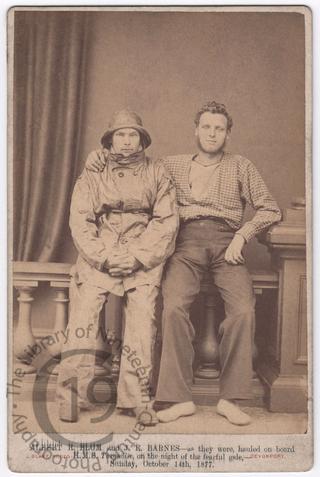
Alfred Richard Blom and John Emmanuel Barnes
During a terrible storm in the Channel on the night of 14-15 October 1877, a wooden barque named the R. H. Jones floundered and sank in Plymouth Sound, with the loss of twenty-one souls. Another ship, the HMS Turquoise, was nearby and came to her assistance but arrived too late. One young German seaman had survived, however, and was clinging to a broken spar amidst the churning waves, his faint cries barely audible through the darkness. The sea was too high and too full of wreckage for the Turquoise to lower any boats, but Barnes, a Royal Navy gunner en route to the Pacific, volunteered to swim across with a rope tied around his waist, enabling the crew to haul the two men back across the divide.
Newspaper reports gave the younger man’s name as Albert Richard Blom, though he’s identified here in the lower margin as Blum. According to one source he was Finnish, not German. For at least a fortnight, newspapers identified his rescuer as coxswain Frederick Barnes, but later reports gave his name correctly as John Emmanuel Barnes.
In recognition of his gallantry, the Captain of the Turquoise presented Barnes with £10. Two local MPs subsequently gave £5 each, a group of Plymouth solicitors subscribed £5 10s among themselves and further sums were received through public subscriptions. Other rewards included a gold watch, an ormolu timepiece, a barometer and a telescope, all of which were presented to Barnes at a meeting in the Temperance Hall in Devonport.
According to Our Blue Jackets: Miss Weston’s Life and Work among Our Sailors (1881), a Christian text by Sophia Wintz: ‘This man was a Christian, and a total abstainer. The next day he brought Blom to the Sailors' Rest to be taken care of, for he had neither food nor clothing; it was a touching sight to see the gratitude of the saved man towards the brave sailor who had rescued him from a watery grave. He watched his retreating figure from the window, and counted the hours until he should return. Meanwhile every care was taken of the poor foreigner; money was collected, and a fresh outfit purchased. After a week's absence Barnes returned, and those who witnessed the scene will never forget the meeting of the two friends. Albert Blom being a Finlander, and only imperfectly understanding English, was unable to join very fully in the chat going on around him; he was sitting by himself in the Reading Room when the sound of Barnes' voice reached him; he jumped up, and with one bound cleared the staircase, rushed into the bar, and like a foreigner threw both his arms round his rescuer's neck, and kissed him on both cheeks.
‘Barnes good-humouredly unclasped his arms, and putting both his hands on his shoulders, shook him as he would a Newfoundland dog, and looking earnestly in his face said, "Blom, my boy, how are you? I've been praying for you ever since I've been away; you know I've saved your body, but I shan't be happy till I've saved your soul too: do you ever read your Bible?" Many evenings after that the men were to be seen turning over the pages of the Book of Books, in deep and earnest converse, and before Albert Blom went to sea again, he left abundant proof, to use his own words, that "God had not washed him up on the doorstep of the Sailors’ Rest in vain, for he now trusted in Jesus as his Saviour, and loved the open Bible."’
In 1881 John Emmanuel Barnes married Sarah John Moxey, daughter of a rope-maker in the dockyard. Their marriage produced four children: Daisy, Amy, Percy and Horace. He died, aged 44, on 8 May 1900 at 52 Claremont Road, Fratton, Portsea, leaving effects valued at £145. In 1901 his widow and children were living at 45 Sandringham Road, Portsmouth. Sarah Jane was the head of the household, which included five lodgers, so presumably the family were financially secure. Sarah Jane died, aged 52, on 30 August 1907.
Photographed by J. Blake of Devonport.
Code: 127001




